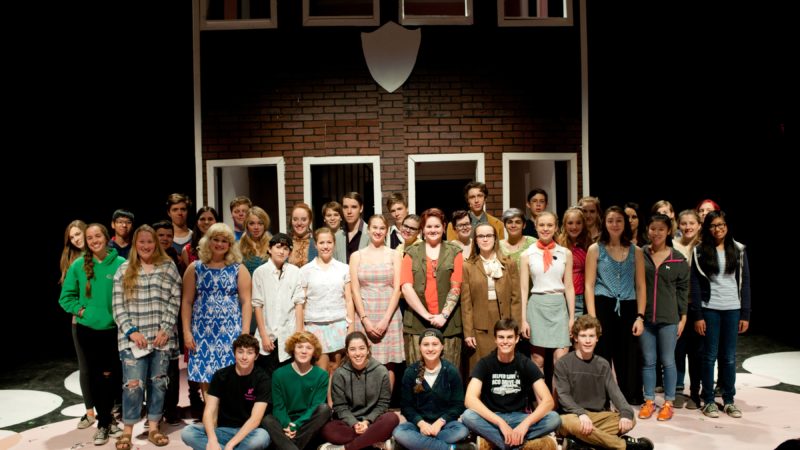Fire, Water, and Theater
This fall’s Upper School production of Legally Blonde celebrated and deepened the natural intersection of education and community at Waynflete. Staging a musical always creates a myriad of choices, and this year, a particularly difficult one arose at nearly the last minute. In the face of the tragedy that befell our community just days before opening night, we had to decide whether or not the show would even go on.
Yeah, some choices are easier than others. About two weeks before the opening, I found myself standing, head cocked in thought, weighing different features of a pair of blonde wigs: straight or curly locks, longish or just a little longer bangs? There are so many variables and this is just one of a myriad of choices that arise when directing and producing musical theater. Theater requires attention to even the smallest choice. Wig selection is barely a blip compared to selecting the show itself, negotiating the performance dates, and arranging an ensemble from the gathered actors at auditions.
Elinor Fuchs, a Yale Professor of Dramaturgy and Dramatic Criticism and one of my personal heroes, says, “It’s as hard to get from almost finished to finished as to get from beginning to almost done.” Three days before we opened, at a critical moment in our production process, the staff, cast, and crew were faced with our most difficult choice: whether or not, in the face of a tragedy permeating our community, to put on a show that would compel the actors to sing, dance, and smile.
There was no clearly “correct” way forward. Should we stop and cancel the show in order to save the 43 students the painful labor of grinning through tears and working throughout 11 hour days when they were already emotionally exhausted? Or, perhaps we should postpone production until the psychological fog lifted, if ever. What we chose to do was to persevere, to push through the fog, to hold up a light for ourselves, and to find our own way out.
I really can’t say it any better than Tina Packer, Founding and Artistic Director of Shakespeare and Company in Massachusetts, “A theater is more than a Theater. It is a place for debate and exchange. It is a place for education. It is a place for community. At its core is humanity and understanding. Its contribution is creativity.”
Her words convey why I love theater, and why, in an age of tiny screened pics and personal video, we still ask our students to pursue and engage in live performance. Gathering in darkened spaces in public masses to participate in living theater is an ancient impulse. To communally participate in storytelling seems to be rooted far more deeply than one could casually assess from the screen-faced non-interaction witnessed on the streets and in our own homes. This choice to enter into reciprocal and participatory storytelling and share these narratives elevates both the experience and the participants.
French theater director and actor, Jean Vilar, wrote that theater could be seen as a public service on the same level as gas, electricity, and water. I appreciate Mr. Vilar’s perspective that the community benefits of theater are as essential as fire and water are to health. In our case, with the production coming at such a difficult time, the benefit to the Waynflete community of such a hilarious production took on a significant healing energy. It was truly a thrill to witness and contribute to the process of converting painful energy to celebration. Before three packed houses, the entire ensemble chose to engage and rose magnificently to the challenge, bringing the entire Waynflete community with them.




